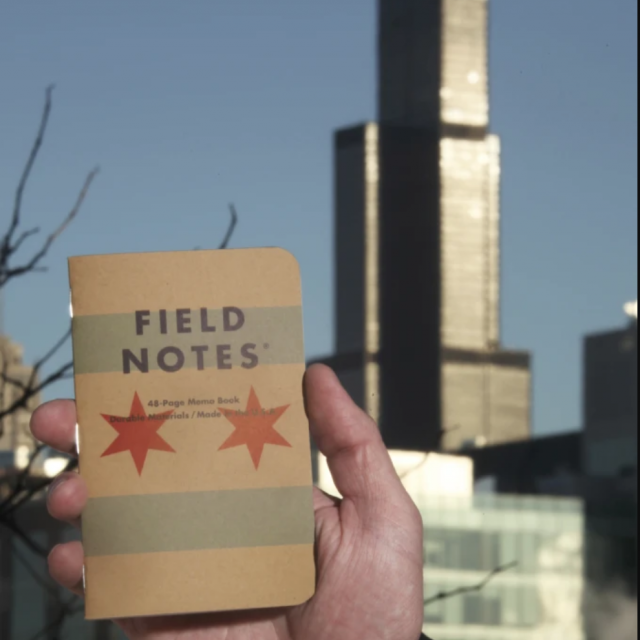
Studying Chicago with Chicago Studies (CHST)
Chicago Studies supports students and course instructors in studying Chicago both in and beyond the classroom. We cross-list Chicago-focused classes across the College as Chicago Studies (CHST) classes each term, and regularly sponsor special opportunities such as the Chicago Studies Quarters. For students, these can count toward the College's interdisciplinary Certificate in Chicago Studies. We also offer safety tips for students as they engage the city during the COVID-19 pandemic.
For instructors, we support virtual and in-person Chicago-based teaching with course/instructional design consultation, microgrants and logistical support for experiential learning "in" the city, and more.
Chicago Studies (CHST) Classes
Chicago Studies classes may include ANY of the following:
-
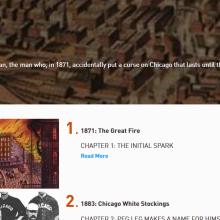 Content about Chicago
Content about Chicago
Explored from any disciplinary or interdisciplinary perspective
-
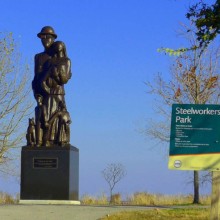 Experiential Learning in Chicago
Experiential Learning in Chicago
such as fieldwork, community-based learning, or undergraduate research
-
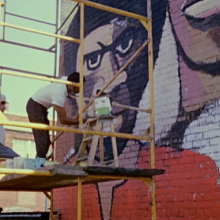 Collaborative Academic Projects
Collaborative Academic Projects
developed and executed with one or more Chicago community partners
-
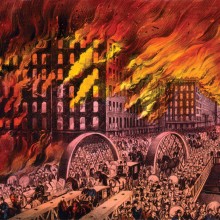 Topics or Methods in Urban Studies
Topics or Methods in Urban Studies
that consider or are applied to Chicago as a significant example
CHST Classes – Winter 2021
The following courses explore aspects of Chicago's ecology, culture, politics, history, social structure, and economic life, either as their primary focus or as a significant example. Several explore topics or methods in urban studies using Chicago as a significant example or case study; many engage students directly in the life of the city’s communities, cultural institutions, or community organizations through in-person and/or virtual experiential learning and fieldwork. All may contribute to fulfillment of the academic requirements of the College’s interdisciplinary Certificate in Chicago Studies, if taken as part of an approved sequence with other classes. New for Winter 2021: Chicago Studies classes are now cross-listed as "CHST," making them easier to find in the catalog. Look for the "Chicago Studies" search term among the academic programs, or search for CHST when you're choosing your classes!
Schools and Space: A Chicago History – Nicholas Kryczka
HIST 27307; CHST 27307; EDSO 27307; PBPL 27307; GNSE 27307; ARCH 27307; AMER 27307
This course fuses urban and educational history into a two-century case study of Chicago. When the Chicago Public Schools closed fifty schoolhouses in 2013, many stressed the links between public education, uneven neighborhood investment, and racial segregation. But this episode was part of a longer regional history of how metropolitan development, labor markets, and anxieties over migration affected educational policy. The course stresses the relationship between educational policy and the politics of urban development, gender, and race. Schools were sites of gendered work, for the women who operated them and for the children who navigated the moral and vocational paths laid for their futures; meanwhile, the rise of racial ghettoes had an enduring impacts on educational inequity and the shape of African American political life. Over the time span covered by the course, the United States became an indisputably "schooled" society, and Chicago was a leading indicator of national trends. Key historic episodes in American education-the rise of the modern high school, the birth of progressive education, the origins of teachers' unions, the Catholic encounter with race, the fragmentation of suburban school districts, the civil-rights critique of de facto school segregation, the pronounced "failure" of urban education, and the triumph of choice-and-accountability reforms, and the teacher-led resistance that followed-are especially well-illustrated by this course's focus on Chicago.
Reimagining Justice in the Chicago Police Torture Cases – Alice Kim
HMRT 22217; CHST 22217
From 1972 to 1991, former Chicago police commander Jon Burge and white detectives under his command systematically tortured over 117 Black people in police custody. In May 2015, 43 years after the first known instance of torture, Chicago became the first municipality in the U.S. to provide reparations to those harmed by racially-motivated law enforcement violence, passing legislation for survivors of the Burge police torture regime. This course explores the evolution of decades of community activism and creative organizing undertaken in the Jon Burge torture cases. We will consider the following questions: What do these cases and the activism surrounding them reveal about policing and the criminal legal system? What role did torture survivors and those directly impacted by Burge torture play in struggles for justice? How can we reimagine systems of justice and accountability? How can society reckon with legacies of state violence and their ongoing impact in communities today?
Process and Policy in State and City Government – Clayton Harris
PBPL 28501
This course consists of three interrelated sub-sections: (1) process and policy in city and state government; (2) the role played by influential, key officials in determining policy outcomes; and (3) policymaking during and after a political crisis. Issues covered include isolating the core principles driving policy at city and state levels; understanding how high level elected officials can shape the course of policy; and determining how a political crisis affects policy processes and outcomes. Most of the specific cases are drawn from Chicago and the State of Illinois.
The Rise and Demise of Polish Chicago: Reading Polonia's Material Culture - Bozena Shallcross
REES 27021; CHST 27021; ARCH 27021
Chicago claims to have the largest Polish and Polish-American population in the US and yet the city's distinctly Polish neighborhoods are now only history as their population has dispersed or moved to the suburbs. This course explores the diminishing presence of Poles against the lasting input of the material culture which they introduced to the urban spaces of Chicago. The course is framed by the fundamentals of thing discourse and employs the mediums of sculpture, fashion, photography, architecture and topography of the Polish community in Chicago through several field trips. The course's main goal is to map the evolution of the former Polish neighborhoods which often concluded with the erasure of their distinct ethno-space. In order to grasp the status of such changes, students take several field trips to the former Polish neighborhoods and visit their existing architectural landmarks and cultural institutions. Towards the end of the course, students conduct several interviews with Polish Chicagoans from the postwar and Solidarity immigrations. The course concludes with a capstone project for which students will make a virtual collection of artifacts designed as a curio cabinet filled with objects they found, created, and purchased during their research and field trips.
Lakefront Kiosk – Martin Felsen
ARTH 24197; ARCH 24197; CHST 24197
Students will design kiosks on Chicago's lakefront, one of the city's most vibrant public spaces. Historically, the shoreline of Lake Michigan has played a central role in Chicago's urban identity. In the 1909 "Plan for Chicago" Daniel Burnham proposed to reclaim the entire length of the lakefront as a place of leisure for all inhabitants of the city-an idea realized during the 20th century. The Chicago Park District oversees over 40 kiosks that punctuate the shoreline, which during the summer offer food, retail, and recreational services. Although these kiosks are, by necessity, modest in size, these structures are an exciting opportunity to explore creative architectural solutions. The design studio will identify the lakefront as a new realm of architectural imagination that operates on the scenic threshold of the city and at a more intimate scale. Though small-a work of micro-architecture-a kiosk can reinforce the city's broader commitment to forward-thinking design. The studio's challenge is to demonstrate how small-scale architectural design can transform public space. The kiosk will be designed as both a seasonal commercial space, and year-round space for exhibiting information about Lake Michigan-from its history as an industrial machine to its potential future as an ecological preserve. It will explore how a kiosk engages with both visitors and the surrounding environment, and how a kiosk maintains an active presence on the lakefront and attracts visitors year-round.
Architecture of Memory – Nootan Bharani
ARTH 24267; ARTV 24267; ARCH 24267; CHST 24267; ENST 24267
This architecture studio course will explore the concept of spaces created as memorials or for the purpose of holding or preserving memories. Design projects and spatial concepts will be the main focus for the class. Students will also research and critique existing built projects and visit spaces around the city to form a basis for understanding and analyzing architecture. Students will generate a portfolio of 2D and 3D spatial explorations throughout the quarter. For final design projects, students will choose real sites and will create a design for a memorial for an aspect of social history of the South Side and/or the Washington Park neighborhood of Chicago. Visits to exhibitions around Chicago and current events stories will serve as starting points for project subjects. Students are required to attend the first seminar to enroll in the course. Excursions across the city will occur during regular meeting times, but a make-up option will be outlined and permitted.
Though basic tools and materials for model making will be available for sharing during studio or through a tool library, some students may find it beneficial to obtain their own items for use outside of class time and to supplement what is provided.
(Re)constructing Nature: Restoration Ecology in a Time of Climate Change – Alison Anastasio
ENST 21440; CHST 21440
Restoration ecologists, environmental professionals, and average citizens all participate in the process of habitat restoration. How does this interdisciplinary practice balance the priorities of ecosystem function and services, conservation of imperiled species and habitats, aesthetic appeal, and human use in a dynamic climate? In this course students will gain a broad overview of the field of restoration ecology and approach it from scientific, practical, and humanistic perspectives using scientific literature, case studies, and planning documents.
Environmental Justice Field Research Project II – Raymond Lodato
ENST 26355; CHST 26355; PBPL 26355
This two-quarter sequence will expose students to real-world policy-making questions and field-based research methodologies to design an environmentally based research project, collect data, conduct analysis, and present findings. In the first quarter, we will follow a robust methodological training program in collaboration with University partners to advance the foundations laid elsewhere in the public policy studies program. In the second quarter, this expertise in a full range of research methodologies will be put into practice to tackle public policy problems in the city and neighborhoods that surround the University. PBPL 26255 and PBPL 26355 satisfy the Public Policy practicum Windows and Methods requirements.
Doing Fieldwork: Mobilizing Ethnography to Investigate a Radically Transforming Global World – Natalja Czarnecki
GLST 26275; CHST 26275; ENST 26275
In the age of "post-truth" politics; of globally-scaled and mediatized flows of information, bodies, and biological threats; of magnified uncertainties related to public safety, to conditions of geopolitical belonging, and to human rights themselves, how do we, as ethical researchers, approach emergent social issues in a radically transforming global world? In this course, students will explore the investigative and critical potentials of qualitative research, with a focus on ethnographic fieldwork and discursive analysis. How do we recognize, collect, and make sense of fieldwork data, when our questions deal with seemingly intangible concepts? What does "home" mean, for immigrant and diasporic communities and what do concepts like "place," "space," and memory have to do with it? How do people in urban contexts, especially those who rely on mass transit, service and gig economy workers, and first responders in cities like Chicago manage daily life in conditions of existential, biological, and extreme economic threat in the age of COVID-19? How do we "know" experiential categories like anxiety when we see them, and how do we, as ethical researchers, find answers to questions in our ethnographic materials, without imposing our own conceptual constructs on them? In this collaborative forum, students will practice, share, and critically engage with ethnographic methods, including participant observation, documentation, interviewing, historical research, and discourse analysis.
Women of the Avant-Garde – Rivky Mondal
GNSE 12106; CHST 12106; ENGL 12106
This course provides an introduction to the written materials of women artists who belonged to various twentieth-century avant-garde movements and circles. The institutions of "woman art" and "the avant-garde" will come under scrutiny as we consider the literary and archival miscellany of pan- & non-sexual, cross-generational, inter-aesthetic, multilingual, and transnational works by such makers as Gertrude Stein, Gwendolyn Brooks, Clarice Lispector, Frida Kahlo, and Yoko Ono. How do these artists conceive of their work and process as interventions into social, political, and historical realities? How does their subjective view of those realities provide an account of the identificatory powers of their gender and sexuality? We will examine the ways in which abstraction in writing becomes useful for commenting on issues raised by feminist and queer theory, periodization, canonization, and institution. Taking to the Regenstein's Special Collections Research Center, we will also open up the criticism, diaries, and letters of these artists to gain a new perspective on their creative processes. In addition to learning how to constellate these materials with the course readings, students will acquire hands-on experience in archival research, annotation, and curation as they make an archival project of their own. Students' final projects will serve as the basis for a prospective library exhibition in concert with Special Collections.
Sociophonetics – Jacob Brennan Phillips
LING 21720; CHST 21720
Variation is a ubiquitous feature of speech, yet most variations observed are non-random. This course will examine this type of structured heterogeneity (Weinreich et al. 1968) from the point of view of sociophonetics. We will focus on the interrelationships between phonetic/phonological form and social factors such as speaking style and the background of the speaker, with a particular interest in explaining the origins and transmission of linguistic change. Our goals will be to (a) acquire the phonetic and phonological foundation necessary to conduct sociophonetic research through practical exercises; (b) survey new sociolinguistic research that addresses issues in phonetic and phonological theories; and (c) locate and explain phonetic variation in its social context while drawing on current approaches to the relationship between language and society. This course will give students hands-on experience with designing and conducting experiments. As part of the empirical foundation of this course, we will focus on sociophonetic variation across Chicago neighborhoods. For a final project, students are required to conduct a small-scale study investigating a research question of relevance to sociophonetic research. LING 20101 or graduate student standing required.
The Business of Non-Profits: The Evolving Social Sector – Christa Augustina Velasquez
PBPL 24751; CHST 24751
Led by an experienced practitioner, this course aims to provide both an intellectual and experiential understanding of the contemporary nonprofit sector. In addition to a seminar component examining the rapidly evolving social sector, students engage in a hands-on consulting project for a Chicago-area nonprofit involving analysis, reporting, and presentation. This course satisfies the Public Policy practicum WINDOWS requirement.
Public Policy Practicum: Interview Project on Policing – Chad Broughton
PBPL 26304; CHST 26304
This one-quarter practicum in qualitative methods aims to develop interview research skills-including instrument design, questioning, transcription, thematic analysis, and write-up-in the context of a mini-BA thesis trial run. The topic of this version of the practicum is policing in America. Students will engage in several in-class interviews with informants with wide-ranging vantage points on police-citizen relations as a social and policy issue including scholars, activists, police officers, and policy-makers. Meant to prepare Public Policy students for the BA thesis process, each student, using in-class interviews conducted by students-and supplemented by interviews, observations, and other data exercises of their own-will formulate a question related to policing and construct the component parts of their own "Mini-Thesis," which they will submit at the end of the quarter. In addition, this course will have an ExoTerra component in which students will develop-based on what they've learned in class-a system of policing and punishment de novo as part of an educational role-playing game. Students can volunteer to participate in this component all quarter. Open only to Public Policy Studies majors. Can fulfill either the "Methods" or "Windows" major requirement. Strongly recommended for third-year students.
The Promise of Nightlife: Queer Desires & the Marketing of the Erotic - Eva Pensis
TAPS 20220; CHST 20220; GNSE 20220
In brief, this course will survey various forms of nightlife performance across the 20th and 21st century (drag, stripping, burlesque, variety shows & showgirl performance) alongside popular portrayals of nightlife industries. The course asks what it means (for performers and for pop culture more broadly) that nightlife is thought of as an escape from ordinary life and ordinary or conventional forms of work. The focus of this course will track nightlife performance and industries from the material perspective of the performers, organizers, and collectives that form to address economic, racial, and sexual constraints, in addition to thinking about the figure and function of nightlife in U.S. pop culture's imagination (through, for example, films like Hustlers, Showgirls, etc.). From both questions, we will think through different conceptions and geographies of spectacle, performance, and the erotic that undergird the world of nightlife entertainment. We will also hear from local nightlife performers/artists in Chicago with the option to attend a local nightlife outing as well. We will examine how nightlife has been approached through various disciplines from ethnomusicology, anthropology, performance studies, literary and cultural studies and read works by selected scholars and performers including Esther Newton, Tim Lawrence, Luis-Manuel Garcia, Kia LaBeija, and madison moore.
Styles and Practice in Storytelling - Emily Hooper Lansana
TAPS 22500; CHST 22500
"What is storytelling? It can be said that it is the oldest form of observing, synthesizing, and communicating feelings thoughts and information."-Temujin the Storyteller. Every day we use stories to communicate. This course provides students with an overview of the art and practice of storytelling. Chicago is a storytelling town from the Moth to Second Story and from Story Slams to traditional storytelling; performance artists give voice to a wide range of expression. Throughout this learning experience, students will be encouraged to explore the world of storytelling and to nurture their creative voices. Students will create and adapt tales focusing on personal experience, folklore, history, and ethnography. We will learn through participation and observation. The creative experiences in this course will enable students to further their skills in: oral presentation, story construction, performance, artistic critique, and analysis. Students will develop and perform stories from at least three distinct areas of experience. The course provides a creative space for learning and exploration.
Traversing Borders: The Rhetoric of Immigration - Ryan Solomon
CHST 14300; GLST 24300; PARR 14300
Borders are not simply things - i.e. physical boundaries; rather, they are symbolic constructions that manifest in multiple forms- from language, to dress, to appearance - with the aim of distinguishing insider from outsider, those who belong from those who do not. Both the physical and symbolic borders of citizenship are proliferating, with the result that border-crossings of various kinds are becoming more dangerous. This course will examine the rhetorical construction of borders in the US and other parts of the world, including Europe and South Africa, through analysis of official documents, speeches, and news accounts. The course will also consider the way that migrant rights groups, through their activism, challenge the border logic of citizenship and seek to orient an understanding of citizenship toward a global context. The major assignments for this course will include a rhetorical analysis of relevant public discourse (speeches, social media, examples of activism) related to immigration debates in the US or abroad, as well as a public online forum that will focus on immigrant rights issues.
Inequality, Household Finance, and Tax Policy: A Practicum - Arthur Damon Jones
CHST 29404; PBPL 29404
The first component of this course will feature seminar discussions of inequality in the US, with respect to income, gender and race, and how these interact with US tax policy. We will have a focus on income transfers to low-income households such as the Earned Income Tax Credit. We will also review current policy topics in Household Finance, the study of how households save, borrow, and/or use insurance to overcome unexpected changes in household income. In addition, we will discuss the process of filing tax returns, the prevalence of income tax refunds, and the various industries, both non-profit and for-profit, that have arisen around this phenomenon. Next, students will go into the field, and work as volunteer tax preparers for a local, Chicago non-profit, Ladder Up. Students will be trained as tax preparers (which requires a 3-hour training session), learn how these services are delivered, and will also learn about the various social goals and public benefits that are often coupled with this process. Tax season begins in late January, and the students will volunteer weekly for about 6 weeks, until the end of the quarter. Students are also encouraged, though not required, to continue to volunteer until the end of the tax season, April 15th. Finally, students will produce a final project as a part of a group project. This course satisfies the Public Policy windows practicum requirement. Note: due to the limitations created by the current pandemic, students will volunteer remotely with the tax preparation nonprofit.
The Struggle for the University: Critical Scholarship and Research -- Patrick C Lewis
ANTH 22742; CHST 22742; EDSO 22742; GLST 22742
The course aims to develop students' broader knowedge around the scholarship of higher education and to provide students with greater experience with interdisciplinary collaborative research. It combines readings on the politics, political economy and history of the university with participation in a student-developed group research project in which the university, broadly defined, figures centrally as the object or site of study. In the first part of the course, readings explore the university's contested origins in Medieval Europe and the Middle East, its evolving relationship to the philosophy of education and knowledge, and its changing institutional structures. In the second part, readings shift to examine the university in relation to youth politics, with an emphasis on the history of radical student movements and the university as a site of anti-colonial and anti-racist struggles. The third part of the class focuses on the university's roles in the contemporary global knowledge economy and as a site and instrument of capital accumulation. Groups and project topics will be determined by students during the first two weeks. Significant class time will also be given to project development and class feedback, with special attention given to qualitative (e.g. archival and ethnographic) research methodologies.
Research in School Improvement -- David W Johnson
EDSO 27919; CHST 27919; PBPL 27919
Research evidence and data play an increasingly important and complex role in efforts to reform underperforming school systems in the United States. Both education policy and practice increasingly rely on sophisticated understandings of a dynamic interplay of complex organizations, systems, and policymaking. This course introduces students to cutting edge models for using research and data public school reform efforts, including examples of randomized control trials, district-based research, research-practice partnerships, and quality improvement strategies. The course includes concrete illustrations of research that reshaped educational practice drawn from the UChicago Consortium on School Research
Anthropology of Borders -- Callie Maidhof
GLST 25701; ANTH 25256; CHST 25701
Today, the world may seem more connected than ever. Infectious disease, data, global capital, and even "culture" seem to travel in the blink of an eye. At the same time, we're witnessing the fortification of borders, and a resurgence of rightwing ethnonationalist populism on both sides of the Atlantic. Borders take on new significance national debates and security policy, and for those who rarely come into contact with borders, they may seem like mere metaphor for how a nation positions itself with regard to immigration, public health, and trade. But beyond the party platforms of politicians in the world's capitols, borders are very real places, constituted by the practices of state and non-state actors alike, and creating new forms of life in response to the technologies that police them. In this course, we will take an anthropological view of borders in order to understand how they are created, policed, and inhabited, following and bucking trends in the micropractices of military, police, and bordercrossers both legal and illegal.
Urban Spaces and Unnatural Disasters: Humans-Nature Connections in Cities -- Sabina Shaikh
ENST 21750; CHST 21750; ECON 16540; GLST 21750; PBPL 21750
A natural disaster is thought of an event or series of events caused by the Earth's natural forces and processes. These include hurricanes, floods, droughts, wildfires, earthquakes, and other events provoked by the earth's processes. But what about the outcomes of such disasters? How do social, economic and spatial conditions affect the impact of natural disasters on the population? What role do humans play in these events and the outcomes? How does human activity and public policy lead to or mitigate large one-time events like oil spills, as well as chronic conditions like deforestation, pollution, and climate change? Are humans part of the natural system in this context or is the human influence considered "unnatural"? This course explores the human relationship to such disasters, including humans as contributors to the severity and extent of such disasters through energy consumption, land use, public policy and other behaviors, and the response by humans to disasters including mitigation, adaptation, and policy formation and implementation. Students will explore how historic policies both created and mitigated environmental vulnerabilities, and how these risks are distributed across the population. Students will study the role of contemporary human behavior in outcomes related to the environment and natural resources through a series of seminal and current readings, and an independent yet collaborative research project using mixed methods from the social sciences. Must be 3rd or 4th year to enroll.
Check out Sabina's TED Talk and related op-ed.
Cities, Space, Power: Introduction to Urban Social Science -- Neil Brenner
SOCI 20506; CHST 20506; ARCH 20506
This lecture course provides a broad, multidisciplinary introduction to the study of urbanization in the social sciences. The course surveys a broad range of research traditions from across the social sciences, as well as the work of urban planners, architects, and environmental scientists. Topics include: theoretical conceptualizations of the city and urbanization; methods of urban studies; the politics of urban knowledges; the historical geographies of capitalist urbanization; political strategies to shape and reshape the built and unbuilt environment; cities and planetary ecological transformation; post-1970s patterns and pathways of urban restructuring; and struggles for the right to the city.
Read more about Neil's work here.
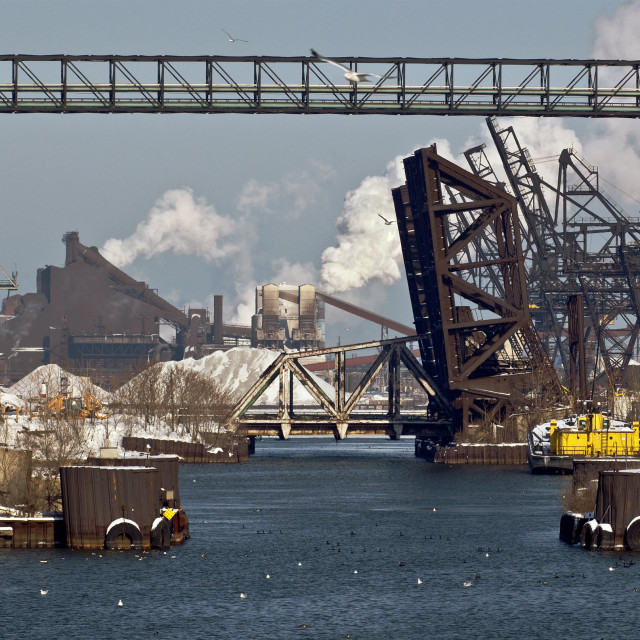
Chicago Studies Quarter
The Chicago Studies Quarter mirrors the University's Study Abroad programs, especially those based in cities, that advocate civic literacy, contact, acculturation, and excursion as companion dimensions of learning. Offered in Spring each year, the Quarter is open to up to 20 College students by application.
Students in the Quarter immerse themselves in Chicago through three interrelated classes, taught by distinguished instructors versed in aspects of the life and history of the city's diverse communities. The classes are organized around a common theme and utilize excursions, guest speakers, and engagement with stakeholder groups and leaders to enrich course readings and assignments. On Fridays, the cohort participates in trips to relevant sites in the city, including restaurants, cultural centers, ecological and historical sites, and advocacy institutions.